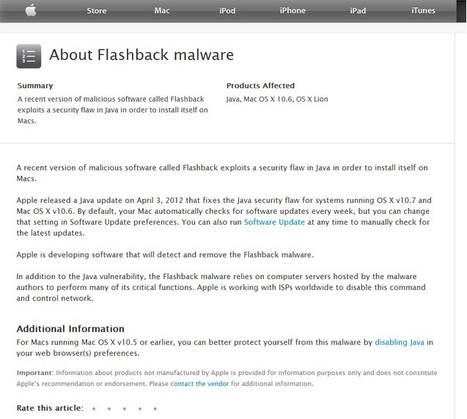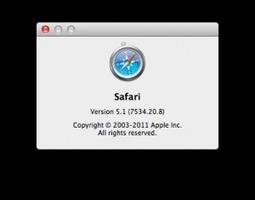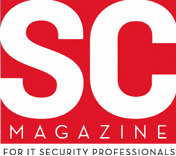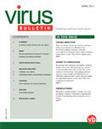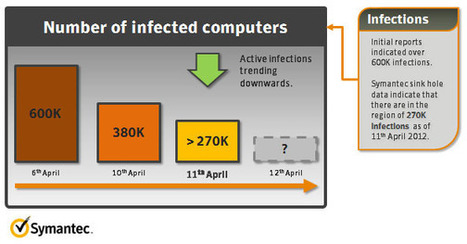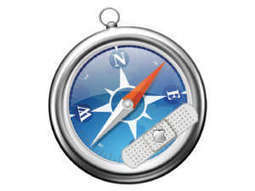 Your new post is loading...
 Your new post is loading...

|
Scooped by
Gust MEES
April 12, 2012 7:05 AM
|
Dr.Web Light Scanner for Mac OS X
Dr.Web Light for Mac OS X is a reliable way to protect your Mac from a variety of threats.
The scanner is based on the latest virus detection and removal technologies. You can use it to scan your system whenever you like. The scanner virus databases are automatically updated with signatures of actual threats on a regular basis. To make protection against unknown viruses even stronger, a heuristic analyzer is implemented.

|
Scooped by
Gust MEES
April 12, 2012 5:46 AM
|
La firme de Cupertino a publié une page spéciale Flashback sur son site de support et indique préparer son propre patch. Apple aurait aussi contacté des FAI et des bureaux d'enregistrements pour tenter d'éradiquer le botnet. Apple sort enfin de son silence. Quelques jours après avoir poussé, sans faire référence à Flashback, une mise à jour de sécurité pour Java sur Mac (voir notre article sur le botnet Flashback), Apple hausse un peu le ton. Et publie sur son site de support une page spécifique au fameux malware qui, d’après Dr.Web, infecterait désormais quelque 655 700 machines. agrandir la photo
===> Une drôle de page tout de même qui n’explique pas comment faire pour savoir si l’on a été effectivement infecté par Flashback, ni comment supprimer le virus de sa machine ! <===

|
Scooped by
Gust MEES
April 11, 2012 5:33 PM
|
Nobody is safe, but you can stop the spread before it overtakes your precious. Mac fans recently got a little taste of what it's like to be a Windows user. That's right, a virus targeting Mac OS X is making the rounds. The latest stats from security companies tracking the virus put the number of infected Macs at well over half a million. That's nowhere near the level of some Windows viruses, but it's widespread enough to be a concern for Mac users.
The virus is known as Flashback and it can hijack your Mac without so much as an administrative password. It manages to pull off its attack by exploiting a vulnerability in Java. Oracle, which makes Java, quickly issued a fix for the problem back in February. Unfortunately, because Apple ships its own version of Java (and therefore must provide its own patches), Mac users had to wait on Apple's fix, which didn't arrive until last week.
===> The slow fix from Apple gave Flashback time to propagate and led to well over half a million infected machines — one of which could be yours. <===

|
Scooped by
Gust MEES
April 11, 2012 12:58 PM
|
In response to the recent discovery of the Flashfake botnet, Kaspersky Lab has announced the availability of its free Flashfake Removal Tool.

|
Scooped by
Gust MEES
April 11, 2012 11:38 AM
|
Apple said Tuesday it's developing a solution to combat the Flashback malware that experts say has infected around 600,000 Mac computers around the world.

|
Scooped by
Gust MEES
April 11, 2012 8:13 AM
|
Apple is developing a tool to "detect and remove" a Trojan that is believed to have infected around 650,000 Macintosh computers. It said it is working with internet service providers (ISPs) to disrupt the command network being used by hackers to exploit the malware. Trojans are infections that can expose computers to control by hackers. It is Apple's first statement on the threat. It issued patches to prevent the malware's installation last week. The two security updates were released ===> eight weeks after Java's developer Oracle issued a fix for other computer systems. <===

|
Scooped by
Gust MEES
April 11, 2012 6:58 AM
|
Apple a indiqué discrètement qu’il mettra bientôt à la disposition des utilisateurs Mac un outil de détection ...

|
Scooped by
Gust MEES
April 11, 2012 6:48 AM
|
Dr. Web's chief executive Boris Sharov, who says Apple never responded when the firm shared its findings on the Flashback botnet. “They told the registrar this [domain] is involved in a malicious scheme. Which would be true if we weren’t the ones controlling it and not doing any harm to users,” says Sharov. “This seems to mean that Apple is not considering our work as a help. It’s just annoying them.”

|
Scooped by
Gust MEES
April 11, 2012 5:46 AM
|
In KB article HT5244, Apple has - apparently for the very first time! - talked openly about a security problem before it has all its threat reponse ducks in a row.
This is good news.
Apple’s iOS mobile platform, like its desktop-and-notebook sibling Mac OS X, has garnered a reputation for strong security. ===> But as new holes in iOS's security crop up, this reputation may be exposed to less-than-friendly fire. <=== GM: NOBODY is perfect!
Apple a livré hier une mise à jour importante de la version 5.1.4 de Safari, comprenant 83 correctifs. Le constructeur en profite aussi pour améliorer les performances de JavaScript sur Mac OS X Lion.
Apple on Wednesday updated its iOS mobile operating system to rectify more than 80 vulnerabilities.

|
Scooped by
Gust MEES
February 7, 2012 11:28 AM
|
Mac users need protecting from themselves as much as they do from malware.
|

|
Scooped by
Gust MEES
April 12, 2012 6:25 AM
|
Fünf Jahre alte Samba-Lücke bedroht Mac OS X und Linux
Ein Angreifer kann über die Schwachstelle Schadcode einschleusen und ausführen. Die Open-Source-Software, die anderen Betriebssystemen die Nutzung von freigegebenen Windows-Dateien und -Druckern ermöglicht, ist in vielen Linux-Distributionen und ===> Apples Mac OS X Server <=== enthalten.
Problem: Betroffene Netzwerkdrucker und -speicher lassen sich möglicherweise aktualisieren.

|
Scooped by
Gust MEES
April 11, 2012 5:52 PM
|
Windows has been the target of malware for decades. This has resulted in a more hardened system and a better user awareness.
On the other hand, OS X has not really needed to go through all the troubles of crime fighting until recently.
===> Now, with its growing market share and lower user awareness, it is clear that OS X is becoming more and more attractive to malware authors. <===

|
Scooped by
Gust MEES
April 11, 2012 5:25 PM
|
OSX.Flashback initially arrived on the scene in late 2011. It has come a long way from its humble beginnings as a social-engineering scam trying to pass off as a fake Flash update using digital certificates purporting to come from Apple.

|
Scooped by
Gust MEES
April 11, 2012 12:32 PM
|
Nach der Enttarnung des Flashback-Trojaners hat Apple nun die Sicherheitslücke geschlossen und arbeitet mit Hochdruck an einem Entfernungs-Tool.
The explosion in development and adoption of smartphones and tablets for both personal and business use in the past two years is both a blessing and a curse to IT departments globally. Known as the Bring Your Own Device (BYOD) phenomenon, on one hand, there is an opportunity for greatly increased productivity and decreased costs. ===> On the other, there are increased security risks, management issues and even data and device ownership and governance issues. <===
Via Gust MEES

|
Scooped by
Gust MEES
April 11, 2012 7:15 AM
|
Kaspersky Lab -- which is offering the free tool -- counted up to 670,000 infected OS X machines in the botnet last week; today has seen just 227,493 so far, up from 208,301 yesterday. Over the weekend, Kaspersky saw a major dip in the number of active infected Macs, from a head count on Friday, April 6, of 650,748, to 248,723 on Saturday, and then 237,103 on Sunday.

|
Scooped by
Gust MEES
April 11, 2012 6:53 AM
|

|
Scooped by
Gust MEES
April 11, 2012 5:55 AM
|
"Apple développe des logiciels qui détecteront et supprimeront le virus Flashback", a indiqué l'entreprise dans un message diffusé par un blog sur son site internet. Les pirates informatiques trompent les utilisateurs de Mac en les incitant à télécharger une fausse nouvelle version du logiciel de visionnage de vidéos Adobe Flash, qui est en fait un cheval de Troie.
Une faille de sécurité grouille dans les arcanes de Safari. Elle permet à un site Internet d’afficher dans la barre d’adresse une fausse URL. Major Security en appelle à la vigilance face au phishing. Or, un tel mutisme n’a d’égal que le risque grandissant que courent les utilisateurs de Safari, plus exposés encore au phishing.
A hole in Apple's mobile Safari can be exploited to display a different URL in the address field than the Web site being viewed in the browser. Users of iOS 5 users, beware a security flaw in Safari that can be used to trick you into visiting potentially malicious Web sites.
Discovered earlier this month by Germany security firm MajorSecurity, the vulnerability could allow cybercriminals to spoof the URL displayed in the browser, trapping users at the wrong sites.

|
Scooped by
Gust MEES
March 13, 2012 1:09 PM
|
Apple hat seinen Web-Browser Safari für Windows und Mac aktualisiert. In der neuen Version 5.1.4 hat der Hersteller etliche Sicherheitslücken beseitigt, die er zum Teil auch bereits in Mobile Safari und iTunes geschlossen hatte.

|
Rescooped by
Gust MEES
from ICT Security-Sécurité PC et Internet
February 27, 2012 3:02 PM
|
Consumerization is happening now, but many IT departments simply aren’t prepared to deal with the new challenges and complexities it entails. With IT managers increasingly urged by CEOs to stop saying ‘no’ and start supporting consumer tools, they need to reappraise their traditional approach. Put simply, IT needs flexible standards – they can’t say no but neither can they say yes to everyone. Cyber crime is a multi billion dollar industry, funded and resourced like legitimate business operations. The criminal gangs need to know that any investment in their own resources is going to provide a decent return, and the best way of guaranteeing that is by targeting the one large homogenous platform, just as they did with Windows in the 90s. In the mobile world, this means iOS. What is clear is that Apple is not the panacea for secure, manageable consumer devices in the enterprise that many believe.
|



 Your new post is loading...
Your new post is loading...



